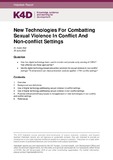| dc.contributor.author | Ball, Kaitlin | |
| dc.date.accessioned | 2022-09-28T09:18:21Z | |
| dc.date.available | 2022-09-28T09:18:21Z | |
| dc.date.issued | 2022-06-30 | |
| dc.identifier.citation | Ball, K. (2022). New technologies combatting sexual violence in conflict and non-conflict settings. K4D Helpdesk Report. Brighton, UK: Institute of Development Studies. DOI: 10.19088/K4D.2022.136 | en |
| dc.identifier.uri | https://opendocs.ids.ac.uk/opendocs/handle/20.500.12413/17664 | |
| dc.description.abstract | There are a significant number of new technologies aimed at combatting sexual and gender-based violence (SGBV)—primarily in the form of “emergency mobile apps”, but they are generally geographically and culturally limited, and under-studied. There are fewer applications of new technologies addressing conflict-related sexual violence (CRSV), as regards prevention, monitoring, and early warning systems. Well established issues related to the under-reporting of SGBV also impact the accuracy of digital monitoring tools used in both conflict and non-conflict contexts. The use of digital tools to combat SGBV also raises novel challenges related to new technologies, such as bias and data protection concerns.
This report reviews evidence of the deployment of new technologies to address sexual and gender-based violence (SGBV) both in and outside of conflict settings, and the potential for applications from non-conflict settings to apply to CRSV. Although certain literature is beginning to address the specific limitations of new technologies (e.g. usability in urban environments, cultural and linguistic appropriateness, and other accessibility questions), the limited nature of the literature assessing these new technologies and—more importantly—the design of these new technologies, means that the needs of disabled individuals, LGBTQIA+, and even men and boys, are often not centred or addressed in the design and critique of these new technologies.
The review found that the studies assessing new technologies designed for and deployed in non-conflict settings identify many of the same issues affecting societal understanding of SGBV generally (under-reporting, for example), as well as new issues specific to the digital turn, such as serious and evolving privacy and data protection concerns. As regards the application of new technologies to CRSV specifically, both the applications and literature assessing them are nascent. Nevertheless, scholars are seeking to define frameworks aimed at harm reduction for the proliferation of new technologies in the humanitarian field specific to CRSV. | en |
| dc.description.sponsorship | Foreign, Commonwealth and Development Office (FCDO) | en |
| dc.language.iso | en | en |
| dc.publisher | Institute of Development Studies | en |
| dc.relation.ispartofseries | K4D Helpdesk Report;1174 | |
| dc.rights.uri | https://www.nationalarchives.gov.uk/doc/open-government-licence/version/3/ | en |
| dc.subject | Gender | en |
| dc.subject | Sexuality and Development | en |
| dc.subject | Technology | en |
| dc.title | New Technologies for Combatting Sexual Violence in Conflict and Non-conflict Settings | en |
| dc.type | Helpdesk | en |
| dc.rights.holder | © Crown copyright 2022 | en |
| dc.identifier.doi | 10.19088/K4D.2022.136 | |
| dcterms.dateAccepted | 2022-06-30 | |
| rioxxterms.funder | Default funder | en |
| rioxxterms.identifier.project | K4D | en |
| rioxxterms.version | VoR | en |
| rioxxterms.versionofrecord | 10.19088/K4D.2022.136 | en |
| rioxxterms.funder.project | 0986883a-6d0f-4bb8-9c46-5e0682934d65 | en |

